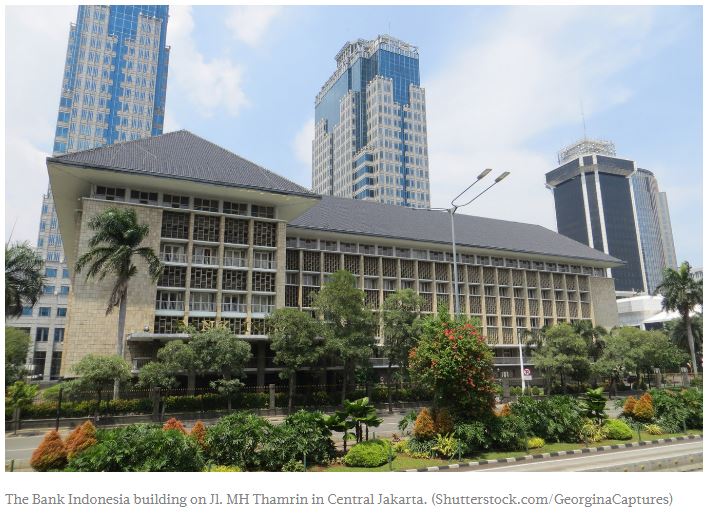Indonesia: Foreign exchange reserves strengthen in February
The issuance of foreign-denominated global bonds by the government has contributed to strengthening the country’s foreign exchange reserve position, Bank Indonesia (BI) announced on Friday.
Foreign exchange reserves were recorded at US$123.3 billion in February, higher than the $120.1 billion that was booked in January.
The central bank estimated the current foreign exchange reserve level was adequate to finance 6.9 months of imports or 6.7 months of imports and payment of the government’s short-term external debt. The foreign exchange reserve level was well above the international adequacy standards of about three months of imports.
BI Governor Perry Warjiyo said in Jakarta on Friday that the latest foreign exchange reserves figure was “more than adequate” for Indonesia for the payment of its short-term external debt, imports financing and to act as buffer for the central bank in stabilizing the rupiah’s value.
“The increased foreign exchange reserve [in February] was more than enough to finance the imports, [government’s] short term external debt and for stabilizing the rupiah’s exchange rate,” said Perry.
The increase of foreign exchange reserves was driven by the issuance of global sukuk (sharia-compliant bonds), as well as by foreign exchange receipts from the oil-and-gas sector, BI said in a statement.
The government had issued $2 billion in global sukuk last month, which comprised a $750 million green global sukuk with 5.5 years maturity and a $1.25 billion sukuk with 10 years maturity.
The increased foreign exchange reserve level, however, was occurring at a time when the rupiah was slightly weakened because of risk-off sentiments in the market, which led to a stronger United States dollar.
The rupiah weakened to Rp 14,223 against the greenback on Friday, down from its previous day’s level of Rp 14,129 per US dollar, data from the Jakarta Interbank Spot Dollar Rate (JISDOR) revealed. The rupiah’s position in the spot market was even weaker at Rp 14,314 per US dollar, down by 1.21 percent, according to data from Bloomberg.
Perry said the central bank would maintain its presence in the foreign exchange market to stabilize the rupiah, along with its fundamental value, while also maintaining the market mechanism.
He added that the rupiah’s depreciation over the past week was mainly driven by external risk-off factors that boosted the greenback, such as positive manufacturing data from the US, the European Central Bank’s (ECB) dovish statement, upward movement of global oil prices and geopolitical factors such as uncertainties over Brexit and the failure of a recent US and North Korea summit to produce a positive outcome.
“[These] global factors brought risk-off sentiments, which led to a strengthened US dollar against other currencies, including the rupiah,” said Perry, adding that domestic factors remained positive, marked by low inflation and incoming foreign portfolio capital, among other things.
Tokyo-based economist Eric Sugandi said the factors cited by Perry were likely to be temporary, while identifying that a potential downturn in the global economy, as well as in the US and Chinese economies, in 2019 and 2020 was a potential threat to the rupiah’s value in the long run.
“The slowdown of the US and China’s growth could suppress Indonesia’s exports, which would weaken the fundamental support from Indonesia’s economy for the rupiah’s [exchange rate],” said Eric.
Persistent depreciation of the rupiah’s value may force BI to intervene in the market to stabilize the currency, a move that would deplete the foreign exchange reserves, said Center of Reform on Economics (CORE) Indonesia research director Piter Abdullah.
However, he said that the external development remained tilted to the downside, marked by a slowdown in global growth and a dovish stance by the United States Federal Reserve.
“The dovish global environment would likely be more influential in the long term, [which would lead to] slight pressures on the rupiah and a maintained foreign exchange reserve [level],” said Piter, adding that Indonesia would have the opportunity to build up its foreign exchange reserves as the rupiah stabilized.
Source: https://www.thejakartapost.com/news/2019/03/11/foreign-exchange-reserves-strengthen-in-february.html


 English
English




